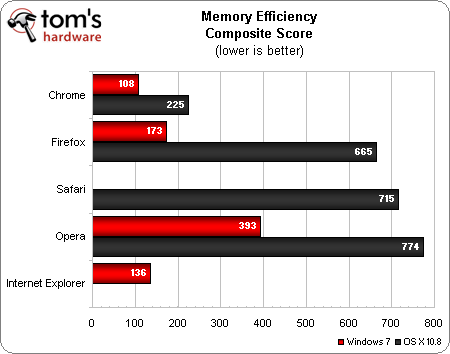Web Browser Grand Prix: Firefox 15, Safari 6, OS X Mountain Lion
Today we're breaking out the Hackintosh for our first-ever Web Browser Grand Prix on Apple OS X 10.8 (Mountain Lion). How will Chrome 21, Firefox 15, Opera 12.02, and Safari 6 stack up against each other, and to IE9 and the rest of the Windows 7 browsers?
Memory Efficiency
Why you can trust Tom's Hardware
Composite Scoring
Overall memory efficiency is gauged by the difference between a browser's single-tab memory usage and final -39-tab memory management total. The browser with the lowest score is able to return the most physical memory back to the operating system without actually closing the application itself, but simply by decreasing workload (closing tabs).
Chrome takes the lead for memory efficiency on both operating systems, as Firefox takes second place on OS X and IE9 takes second under Windows 7. Third place on OS X goes to Safari, while Firefox takes third on Windows 7. Opera finishes last on both platforms.
Drill Down
The charts below are for the single-tab and 40-tab memory usage tests, followed by the -39-tab and -39-tab plus two-minute memory management tests.
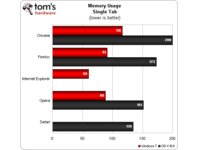
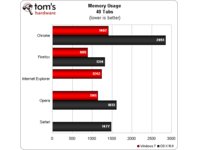
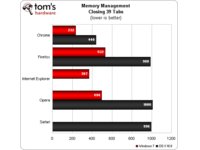
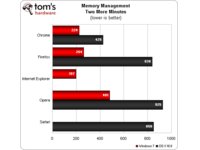
The three cross-platform browsers all report approximately double the memory usage on OS X than on Windows 7. Firefox only gives back about one-third of its 40-tab memory usage total on OS X, a sharp increase from Windows 7.
Current page: Memory Efficiency
Prev Page Plug-In Performance: Flash, Java, Silverlight Next Page Reliability, Responsiveness, And SecurityGet Tom's Hardware's best news and in-depth reviews, straight to your inbox.
-
Eggrenade It would be nice if I could view the additional charts with only one click, and not in a separate window.Reply -
lahawzel It's nice to see Chrome performing so well, but I'm still waiting on the Chrome equivalents of all the plugins I use in FF before I think about switching. The web just doesn't feel the same without them.Reply
(The nice popular ones like ABP, Lazarus, Greasemonkey all have equivalents; some lesser-used plugins like Rikaichan also have ports by now. Only a matter of time!) -
bennaye chrome is absolutely deserving of the award. say what you will about the frequent patch releases touted as upgrades, chrome is a very good browser, as shown by this month's article. even on OSX there is only a small margin separating chrome and safari. but the one qualm i do have with chrome is the lack of add-ons compared to firefox. and i a lot of people share this concern. the add-ons do make the experience that much better.Reply
as always, a great read. -
adamovera bennayechrome is absolutely deserving of the award. say what you will about the frequent patch releases touted as upgrades, chrome is a very good browser, as shown by this month's article. even on OSX there is only a small margin separating chrome and safari. but the one qualm i do have with chrome is the lack of add-ons compared to firefox. and i a lot of people share this concern. the add-ons do make the experience that much better.as always, a great read.All versions of Chrome hold up incredibly well cross-platform, if you look back at the two Linux WBGPs, it won there, too. Thanks for reading!Reply -
adamovera AdamsTaiwanWould like to see this again after IE10 is released.Absolutely, a Windows 8-based WBGP is already in the cards for October.Reply -
adamovera JOSHSKORNHow about 64-bit Internet Explorer 9 vs Waterfox 15.0?When we have more stable 64-bit browsers, I'll definitely do a 64-bit WBGP - including versus their 32-bit counterparts.Reply -
I wish Tom's would fiddle around with the settings of these browsers for these tests. In every System Builder Marathon you overclock the builds, why not try and crank the most speed while ensuring better memory management out of the browser as well?Reply
Testing these browsers at stock doesn't reveal even an eighth of the picture.
